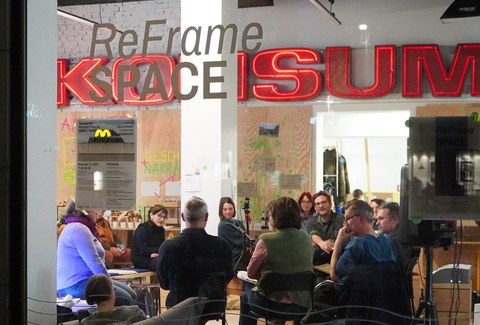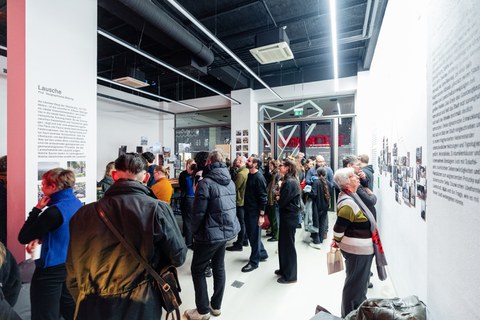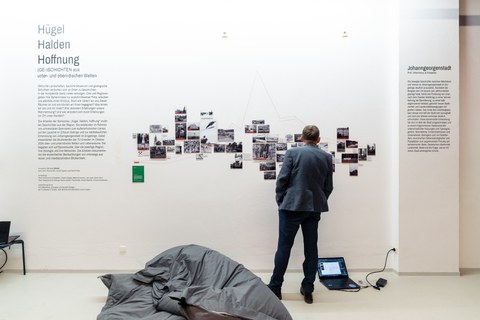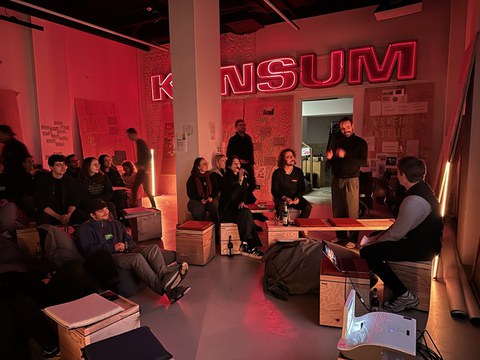11.12.2024
Recap: ReFrame Space Exhibition
How does science enter the urban space? How can topics and places outside urban centers be discussed? What is disruptive about this?
With the Reframe Space, TUDiSC teamed up with the COSMO Science Forum in the middle of Wilsdruffer Straße in the fall and occupied a vacant store. Interdisciplinary and transdisciplinary work, research, discussions and presentations took place here from October 28 to November 24.
The idea and concept was developed between the TUDiSC sub-projects “Transformative Place-Making for Uncertain Futures”, “Disrupt!Research” and “The Disruptivity of the Others in Urban Transformations”. The Reframe Space concept team consisted of Leon Jank, Pauline Mai, Lenard Opeskin and Daniel Peter. The use of the space was made possible by Wir GESTALTEN DRESDEN WGD as part of the Kreativ.Raum.Börse.
The focus was on approaching geological and (spatial) planning processes in Dresden and the surrounding area, Johanngeorgenstadt in the Ore Mountains and the Zittau Mountains, with the aim of questioning and shifting perception and planning processes. The often complex and conflict-laden topics between extractivism, structural change, administration and discourse urgently require new approaches in order to make them understandable and negotiable in an interdisciplinary and transdisciplinary way in the face of new geo-logical dynamics.
The Reframe Space was a workshop location for four weeks, in which students of architecture (Prof. Urbanism & Design) and geography (Prof. Geographical Education) approached the sites of Johanngeorgenstadt and Lausche in the Zittau Mountains thematically based on student seminars and urban design projects. To do this, they hiked the sites in advance on excursions and focused on topics that looked at human-environment relationships. They translated their experiences with the locations into exhibition pieces, which culminated in the exhibition “Hills, Heaps, Hope” with a grand finissage of the Reframe Space on November 21.
The work on the exhibition was accompanied by the Dresden exhibition design team text-objekt-raum, among others. The objects presented narratives and narratives about the respective region, its geology and people. The exhibition was praised by the head of the Office for Urban Planning and Mobility, Dr. Matthias Lerm, who emphasized the connections and dependencies between city and country as well as the importance of such places in urban space that can bring knowledge from civil society and science into vibration. The evening with bar and music as well as the subsequent exhibition weekend offered the opportunity for exchange, critical thinking and new perceptions in the sense of a disruptive research logic.
In addition to working on the exhibition, the space was also used for explorative studies on political agency in cities (Project Doubt). Several evening events enriched the program. Photographer Felix Adler illustrated his work in structurally weak, right-wing, commercialized spaces, including with images from Johanngeorgenstadt. Moreover, the Reframe Space hosted the Symposium “Humanities Perspectives on Energy Transition” (Professorship of North American Literature and Future Studies), which featured five different scholars, both regional and international, foregrounding critical perspectives from the humanities and social sciences on the societal dimensions, futures, and infrastructures of energy transition.
The utilization impressively demonstrated how important it is to create spaces that can generate resonance between the disciplines. If these are centrally located in the city, transdisciplinarity can also succeed. Let's see more of it!




